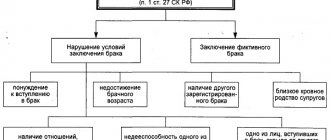Restoration of parental rights after deprivation can only take place if the parent(s) themselves want it. At the same time, a thorough check of the child’s living conditions in the family will be carried out and a proper conclusion will be made. If it is confirmed that the parent has changed his lifestyle and attitude towards the child, the court will return his rights.
To submit to the court, you will need a package of documents confirming the basis for the restoration of rights. Moreover, in each specific case, the documents may differ, so it is better to contact a professional lawyer who will prepare a portfolio.
Procedure for returning parental rights
At the first stage, the parent needs to submit an application to the court with a request to restore parental rights. A claim cannot be filed by relatives or guardianship authorities - only by the parent himself and at his own request. In Art. 72 of the Family Code of the Russian Federation (FC RF) spells out the entire process of restoring parental rights. The question may concern only minor children in need of education.
The main goal of restoring rights will be to meet the needs and desires of the child. According to the law, if he is 10 years old, he can decide his own fate - whether to agree or not to the return of his father (mother) to the family. The issue is considered at a court hearing with the participation of the prosecutor and guardianship authorities.
The process consists of the following steps:
- The parent fills out an application with a request to restore his parental rights.
- He writes an appeal to the guardianship council for assistance.
- A commission of representatives of the guardianship authorities checks the living conditions of the child in the family.
- The person deprived of his rights prepares a package of documents and submits a statement of claim to the court.
- Further, at the court hearing, the father (mother) confirms his intention to restore the rights to the child.
- The same court may also consider a request to return a minor from an orphanage to his family.
Grounds for depriving the child's father of parental rights
Although most cultures assume that the mother is the one who raises the child, the father also plays an important role. The state considers him the main breadwinner of the entire family, so it is not so easy to deprive a man of parental rights. According to regulatory documents, such a decision must be justified and, first of all, satisfy the rights of a minor citizen.
Not every claim to deprive a father of his rights to his children is satisfied by the court. There must be compelling reasons for such a decision. It is important to understand what documents are needed to deprive paternity.
When considering such cases, the courts are guided by the provisions drawn up by the Plenum of the Supreme Soviet of Russia. The 10th resolution of May 27, 1998 states that deprivation of the rights of one of the parents is a last resort. All the reasons why such a decision is applied to fathers are described in the Family Code, in Article 69. Only a few people can demand that the court deprive the father of parental rights:
- mother of a minor;
- adoptive parents;
- guardians and trustees;
- prosecutor;
- representative from the guardianship authority.
The main reason for making such a strict decision is harm to children. Moreover, this can be not only physical damage, but also psychological or material. Let us list the grounds described in modern law for depriving a father of parental rights:
- if the parents are divorced and the child remains with the mother, then the reason for going to court may be the ex-husband’s refusal to pay child support;
- representatives of government agencies can submit an application if a parent refuses to pick up a child, for example, after a minor has been treated in a hospital or the child has been left in a kindergarten;
- the father abuses his rights in relation to the children (causing direct harm to the child or creating conditions that negatively affect him);
- rudeness and cruelty towards the baby, causing moral, physical or mental harm, especially if attempts were made to violate sexual integrity;
- the parent has an alcohol or drug addiction that can be confirmed by medical institutions;
- a man will be deprived of parental rights if he commits a deliberate crime against his child or his mother, for example, beatings will be recorded.
Only the reasons listed above can be accepted by the court for consideration. Anything added by anyone will be ignored. And such actions of the father cannot be ignored, as this can lead to infringement of the child’s rights.
Any allegations will need to be stated in a statement of claim. Usually a parent commits several illegal actions at once. When describing them, the applicant must attach relevant evidence, for example, a reference must be obtained to the court to deprive parental rights to the child. But we will consider what documents are needed to deprive an ex-husband of parental rights in the next section.
Grounds for deprivation of parental rights and filing a claim
Necessary documents for restoration of parental rights
Practice shows that the more documents are presented in court, the more likely a positive resolution of the issue is. At the same time, there is a list of required certificates, without which the claim simply will not be accepted. Therefore, lawyers recommend playing it safe and bringing everything you can collect.
Here is a minimum list of documents that must be brought to court:
- an application requesting the return of lost rights;
- the plaintiff’s passport or other identification document;
- a certificate confirming the existence of a permanent job;
- a positive reference from the company (organization) where the plaintiff works;
- characteristics written by neighbors or other witnesses at the place of residence;
- certificate of salary and total monthly income for six months;
- a document from a medical institution stating that the person deprived of his rights does not suffer from alcoholism or drug addiction;
- if addiction has occurred, you need a certificate of completion of the full course of treatment.
In addition to the above, you will need documents confirming the removal of the child and the absence of arrears in alimony or other payments. Housing and communal services must confirm the availability of housing and its payment, the number of people living in the apartment. Other documents may be required.
List of documents for filing an application with the court
The least difficulties arise in families where the relationship was not officially registered and the man did not want a child. Often in such situations, he abandons the mother and baby and refuses to take part in upbringing and financial support. To go to court you will also need to collect a minimum package of documents. But here there is a high probability of satisfying the plaintiff’s request. Documents for deprivation of parental rights of the father:
- A statement of claim by the mother or any other person admissible to this case, which contains a request to deprive the father of his parental rights.
- Passport of the applicant.
- A certified copy of the minor's birth certificate.
- If the child is 10 years old at the time of filing the application, a written statement from him will be required to consider the case.
- A copy of the marriage certificate and divorce certificate, if the family had broken up by the time of the proceedings.
- In recent years, many couples have decided not to register their relationship. To deprive a man of his rights to a child in such a situation, he will need a certificate from the registry office acknowledging paternity.
- Certificates confirming the parents' income.
- A reference must be provided from the organization where the applicant works and place of residence.
- Child registration paper.
- Conclusion on the living conditions and maintenance of the child. In most cases, this document can be obtained from the housing office department.
- Assessment by guardianship authorities of the living conditions of the place of residence.
- Certificate from the minor's school or any other educational institution.
- Characteristics from the place of study, which should indicate how actively parents participate in raising the child.
- A document describing the parents' property.
- A specialist’s conclusion about the child’s mental state.
- Confirmation that the father is not fulfilling his responsibilities as a parent.
The documents for deprivation of parental rights described in the list above may be supplemented with new papers. This is due to the fact that cases of deprivation of a father’s parental rights are not similar to each other. To file a claim, it is necessary to draw it up correctly, and the law obliges the applicant to submit the application in writing. The form itself consists of several parts:
- The header indicates the name of the authority where the hearing will take place. Information about the plaintiff and defendant is entered (full name, registration address and actual place of residence). Provide information about the representative of the guardianship authority and the prosecutor's office with their address.
- The descriptive part must contain requirements, indicate exactly what the child’s right was violated and refer to the circumstances of the case. Briefly indicate the facts confirming the validity of the accusation and what regulatory documents provide the basis for the legality of the claim.
- The final part contains the claims, a list of all attached documents and the signature of the plaintiff with the date of filing the application.
Below you can find a sample application. To be completely confident in a positive outcome of the case, it is recommended to contact a law office. A professional will better understand what documents are needed to deprive a mother or father of parental rights and will collect them much faster.
How to restore parental rights with child support debts?
If parents have arrears in child support, it will be very difficult to restore rights. According to Russian legislation (RF IC, Article 114), exemption from alimony debt is possible by mutual agreement of the parties. But there is a significant caveat: cases of payment of alimony for minor children are an exception. Restoration of rights applies specifically to minors, and alimony is directly related to the maintenance of the child.
The court may also release the father (mother) from paying alimony if there is evidence that he was ill or other mitigating documents. Insufficient financial wealth is also considered a valid reason.
However, when restoring parental rights, such facts will play a negative role: first you must pay off all debts, and then go to court. All reasons for the deprivation of rights must be eliminated. Lawyers also recommend enlisting the support of the guardianship authorities.
Collecting evidence of the father's guilt
At the stage of preparation for initiating a trial, the plaintiff should collect evidence, because stating one reason for going to court is not enough to satisfy the claim. The court carefully studies all the materials provided in the case of deprivation of parental rights, therefore all facts related to the relationship between parent and child and the negative characteristics of the father himself are important. For the most complete preparation of evidence, you will have to contact bailiffs, guardianship authorities and many other government authorities:
- Contact a law enforcement agency if the father is violent towards the child and the mother herself. Have all abrasions and injuries inflicted by the father on the child and his mother examined at a medical institution, and obtain a medical certificate documenting the injuries inflicted. File a police report about your father's criminal behavior.
- If the father has a criminal record, then you need to get a copy of the court verdict from the court where the case was heard in order to find out the elements of the crime and its severity.
- At the department of the Ministry of Internal Affairs at the defendant’s residence address, request copies of decisions on all administrative violations committed by him. It wouldn’t hurt to talk to the local police officer and, if there are unflattering reviews, take his written testimony.
- If the father evades child support for a long time, you should obtain a certificate of the amount of debt from the bailiffs and obtain a bank statement for the child’s account to which the child support should be transferred. Bailiffs can also provide copies of written warnings to the defaulter and administrative fines.
- Obtain information from the child’s school or kindergarten about the father’s participation in the child’s life. It is better to take information received from teachers and kindergarten workers from them in writing, and also invite them to court as witnesses.
- It is also important to enlist the support of the guardianship authority. You should contact them with a request to conduct an examination of the conditions in which the child lives, and also to establish whether the child’s presence together with his father is dangerous for his life and upbringing. The conclusion of the examination report by guardianship representatives will be one of the significant arguments for the court in the matter of depriving the father of the rights to the child.
How to restore parental rights and pick up a child from an orphanage
During deprivation of rights, the court and guardianship authorities assign the child to an orphanage only when there are no other relatives. The purpose of such a measure is to protect him from danger when life and health are threatened. It is believed that being in a boarding school is temporary. However, if the parents do not take the child, he will live there until he reaches adulthood.
Before the court hearing to restore parental rights, the father (mother) must write an application to the guardianship council with a request to return the child. If the issue is resolved positively, go to the management of the boarding school (orphanage). You need to have a passport with you to confirm your relationship and register your place of residence. The surname of the father (mother) must also appear on the minor’s birth certificate.
It is also recommended to see the child himself and establish contact with him. Good relationships will play a positive role, since the court takes into account the opinions of the children and their desire to live with their parents. In a lawsuit, you can also formalize a request for the return of the child to be raised by the reformed father (mother).
At the same time, the court has the right to demand additional actions - for example, to make repairs in the apartment, to find a higher-paying job. Basically, the list of conditions for the return of a child from a guardian and from a boarding school are similar.
Is the child's consent required?
A child who has not reached the age of 10 at the time of consideration of the case for restoration of parental rights cannot give his consent to this. After he reaches the specified age, he has the right to express his opinion and, if he is against living with his parents again, the court takes this fact into account and rejects the parent’s claim.
Dear readers! To solve your problem right now, get a free consultation
— contact the on-duty lawyer in the online chat on the right or call:
+7
— Moscow and region.
+7
— St. Petersburg and region.
8
- Other regions of the Russian Federation
You will not need to waste your time and nerves
- an experienced lawyer will take care of solving all your problems!
How can a mother regain her parental rights?
A mother who has been deprived of parental rights can regain them if she fulfills the conditions required by the court. The sooner she does this, the better: after six months the child can be adopted, and then restoration of rights will be impossible.
The law does not provide for significant differences between the capabilities of the mother and father. However, practice shows that the court can grant leniency to the mother if she was deprived of her rights due to illness. In this case, the documents must contain medical confirmation of her satisfactory state of health.
Neither the guardianship authorities nor relatives will be able to prevent the mother from communicating with her children if her rights are restored. Within 3 days, the court is obliged to transfer the decision to the registry office at the child’s place of residence. Lawyers will help you track the situation.
Does a father who has been deprived of parental rights pay child support?
Deprivation of parental rights for failure to pay child support terminates all rights in relation to the child, but does not relieve the child from the obligation to support him. A citizen deprived of paternity continues to pay alimony, including if he has a debt on it, he is obliged to repay it.
The amount of alimony remains the same amount or the amount established in the court decision on deprivation of parental rights. The procedure for their retention and transfer also remains the same.
For alimony payments that are delayed, a penalty is charged in the same way as in the case of an eligible parent.
When can the court refuse to restore the rights of parents?
According to paragraph 4 of Art. 72 of the RF IC, the court has the right to refuse if children who have reached the age of 10 do not agree to return to their parents. The reasons why this happens are discussed in the presence of teachers and educators. But the deciding factor will be the child’s opinion.
It is impossible to restore rights if the minor has already been adopted and given to foster parents. Adoption becomes possible after 6 months after deprivation of rights. At the same time, the law does not limit the time frame for restoring the parental rights of the mother or father.
Sources:
“Family Code of the Russian Federation” dated December 29, 1995 N 223-FZ (as amended on May 29, 2019) RF IC Article 72. Restoration of parental rights
“Family Code of the Russian Federation” dated December 29, 1995 N 223-FZ (as amended on May 29, 2019) RF IC Article 114. Exemption from payment of arrears of alimony and (or) arrears of penalties for late payment of alimony
Family Code of the Russian Federation
Drawing up a statement of claim
The court has a lot of samples that allow you to correctly determine the format and structure of the statement of claim.
When drawing up a claim, it is important to make sure that it contains the required details:
- the exact name of the judicial authority;
- information about the applicant – series, passport number, registration address;
- similar information about the father;
- a description of the situation that forces you to go to court (you need to present arguments sufficient to satisfy the claim);
- evidence providing grounds for deprivation of rights.
If the claim is not signed by the plaintiff himself, the representative must include personal information about himself in the application and attach a power of attorney.
The application is prepared in several copies: one for each participant in the proceedings.
Read: how to deprive a father of parental rights without his consent.
Required documents
Before preparing a statement of claim, it is advisable to contact a competent and experienced lawyer who will help not only file a claim, but also collect the necessary package of documents.
The claim must contain the following information:
- Details of the court to which the claim is being filed.
- Full name of the plaintiff, indicating his permanent place of residence.
- If you file a claim through a second person, you must indicate your full name and address.
- Full name of the defendant and his place of residence.
- Reasons why a mother wants to deprive a father of parental rights. As well as a detailed description of the mother’s demands (for example, a requirement to collect child support).
- Evidence that confirms the mother’s position and the facts of violations.
- List of documents attached to the claim.
The list of documents required for a claim is individual for each individual situation. We will provide a standard list that is used most often.
All copies of the necessary documents must be certified by an employee of a notary firm.
Required documents:
- A document that confirms the identity of the plaintiff.
- Certificate from the parent's place of work.
- Characteristics of the parent both from their place of residence and from their permanent job (if any).
- An inspection report on the family’s living conditions.
- Certificate from the child’s place of residence.
- Photo, video and written evidence that will confirm the mother’s position.
- Certificates of marriage, divorce and birth of a child.
What documents will the court require?
Presenting evidence that can convince the court to correct an unscrupulous parent is a primary task. The court will rely primarily on the documents filed and will also hear the parties and witness testimony.
The evidence base for restoring rights to a child consists of:
- documents;
- testimony.
The following must be attached to the statement of claim:
- Certificates of payment of alimony and absence of debts.
- Documents confirming completion of a course of treatment in the relevant medical institutions (PND or drug dispensary).
- Certificates from work about earnings.
- Documents about the living conditions that the parent is able to provide.
Non-documentary evidence is most often presented directly during meetings - witness testimony, speeches of experts, specialists.
In addition to the evidence base, a mandatory list of papers is attached to the claim:
- Personal documents of the plaintiff.
- A copy of the writ of execution on the basis of which the minor was removed from the family.
- Documents confirming the payment of alimony, other evidence confirming the correction of the situation.
The more evidence is presented to the court, the higher the chances of a positive outcome of the proceedings. At its discretion, the court decides to attach or refuse to attach the proposed documents to the case.











